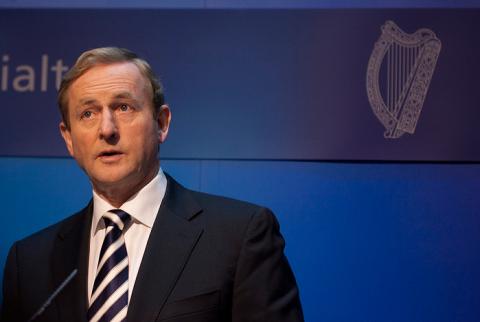Political and clerical hypocrisy on abortion issue

Both Fine Gael and Labour are as one in their determination to expel from their ranks any parliamentarian who votes in accordance with the pledges on which those two parties sought and obtained their mandates. By Vincent Browne.
Enda Kenny has reiterated that there will be no free vote on the abortion legislation which is to be introduced in the Dáil early next year.
He said: "Everybody who's elected to the Dáil has a constitutional duty and when they are members of a party like ours, a political duty.
"That's why we'll have a very calm, very rational, very considered, very sensitive and understanding discussion of all these things."
Whatever discussion there is within the Fine Gael parliamentary party on abortion legislation - if, indeed there is any at all - is unlikely to be calm and is certain to be unconsidered and insensitive.
The only understanding Fine Gael parliamentarians will have is that their opinions matter not at all.
Too bad if they fought the last election on the undertaking by the then Fine Gael director of elections, Phil Hogan: "Fine Gael is opposed to the legalisation of abortion."
Too bad if they believed what Kenny said before the previous election:
"I will not introduce legislation on abortion . . . I am very clear on this. I do not favour legislation on abortion." (This was stated in an interview with me on May 14, 2007, available here).
The decision to legislate for abortion is not a democratic decision of the Fine Gael parliamentary party - which might arguably be binding on all members. There is no constitutional duty on Fine Gael TDs (or any other TDs) to support anything at all - except, again arguably, the democratic process.
There is no political duty that requires Fine Gael TDs and senators to agree to a decision that is not of their making - certainly not to a decision that is in clear breach of an election commitment.
If there is any doubt about the constitutionality of any action or prospective action concerning the issue of legislating for abortion, it is about the constitutionality of Kenny's implied threat to Fine Gael parliamentarians if they oppose a decision they had no part in taking.
There are Fine Gael TDs, such as Peter Mathews, who have a conscientious objection to abortion in any circumstances, and who might not have stood as a Fine Gael candidate in the election if they had been told that Fine Gael would legislate to define the circumstances in which abortion is to be made available here.
Such TDs hold the same views as those expressed in 2007 by Kenny. No doubt they were reassured by the declaration of Hogan a few days before the election that "Fine Gael is opposed to the legalisation of abortion".
What possible justification can there be to inflict any sanctions on Mathews or any of the others if they vote in accordance with declared Fine Gael policy on an issue of conscientious importance to them - as it seemingly was to Kenny?
At least on political standards, Fine Gael and Labour are as one.
Both are determined to expel from their ranks any parliamentarian who votes in accordance with the pledges on which Fine Gael and Labour sought and obtained their mandates, when such vote contravenes the opportunist requirements of retaining office.
All that remains uncertain is whether Fine Gael's hypocrisy matches Labour's, by claiming that those who vote in breach of their election pledges are the courageous ones and, by inference, those who stand by their promises are the cowards.
They are not the only hypocrites.
The Catholic bishops are past masters in this arena, and they have had the effrontery to offer moral guidance to ministers, legislators and the public generally on this issue.
Is there any cabal in Ireland more in need of moral guidance than the Catholic bishops, who purport to be moral guardians?
From among these ranks of the Irish Catholic hierarchy over the years came bishops who colluded in the buggery, rape and abuse of children for decades, who lied about it, pretended not to understand the gravity of it and covered it up.
From the mouths of these same bishops comes justification for the ongoing culture of misogyny and the subjugation of women, with the claim that women are not fit to be priests.
I write in support of the entitlement of TDs to vote without threat on what, to them, is an issue of conscience because abortion is a major moral issue that involves, as it does, the intentional taking of innocent human life.
But, unlike the TDs and senators, who are morally stricken by the issue now before them, I do not believe it is legitimate to deny women the choice about whether their bodies should be used for the sustenance of another human being, irrespective of the trauma, harm or threat to their health that doing so would cause them, even where this other human being had no prospect of survival after birth.
Yes, this is a moral decision of great consequence.
But it is a decision that only the women in question should make.
There is something disturbing about the fact that so many men are determined to enforce their views on women, even though men could never be in anything like the same predicament.
